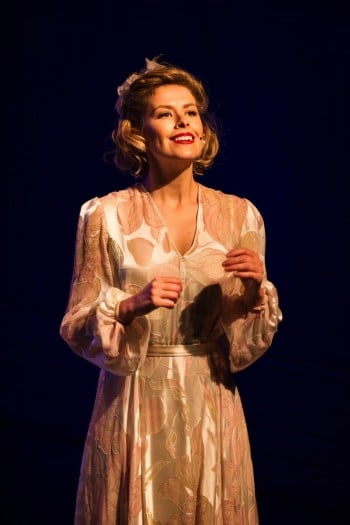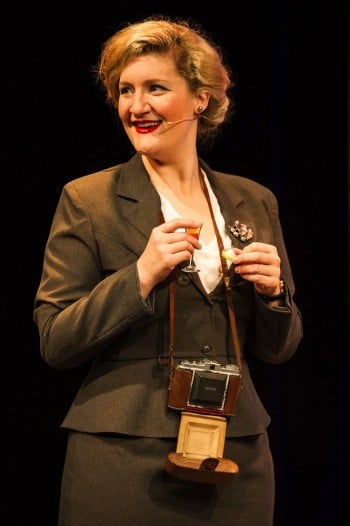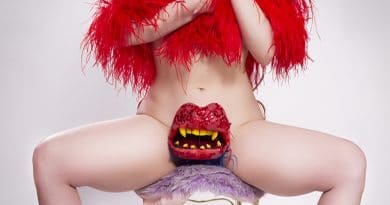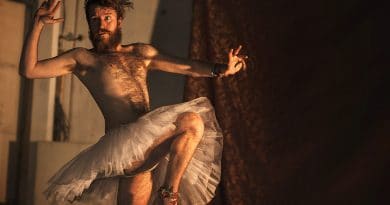Review: High Society, Hayes Theatre Co

High Society is not a high point in programming at Sydney’s Hayes Theatre. Cole Porter is a witty, lively, sensitive and influential writer, and his songs are highly universal but not, in this instance, highly adaptable: the show, and this production at the Hayes, is discordant to the point that it feels trapped in the constant act of stumbling.
Helen Dallimore’s tentative direction doesn’t help matters. Her characters are occasionally lined up on stage to deliver lines with no real action or motivation and her stars, Amy Lehpamer and Bert La Bonte, can’t quite mask this aimlessness with their charm – and Dallimore is good with charm, and so are each of their actors. Their love story and love lost feels more coincidental than anything else, and from that core spins out a feeling that this production is disposable. The set and sound feel muted, constructed out of responsibility rather than out of desire to engage with the art.
The bright, classic plot (its best version being The Philadelphia Story) plays out without polish or overt cleverness. Is it a successful musical? No. The critical measure of success for a musical lies within the marriage of story and music; these elements, generally divided into a show’s book and songs, need to support, complement and further each other toward the narrative’s conclusion.
Wicked, for example, has a simple and serviceable book and tuneful, middling-yet-dramatic, high-stakes, high-tension-soaring music; together, these elements create a strong, fantastical imprint, romantic, with room to breathe.
High Society has a book and lyrics with a marriage is so broken it resembles the main characters in the piece, and not in a good way. It doesn’t matter how witty and fun the songs are when they are crammed into a script that doesn’t care for them or won’t tie into them. When the songs start, the plot stops, and that damages a musical and its sense of momentum, engagement, and involvement for the audience – this is the kind of barrier that makes audience members think they don’t, or can’t, enjoy a musical. It feels disconnected and unreal. The worst thing a musical can do is betray its own universal sense of music as an integral part of the story, of the overall package. High Society at the Hayes does this over and over.
Amy Lehpamer sings “It’s All Right With Me” with conviction but the song absolutely doesn’t fit the moment of the show, the seconds before she’s about to go giddily, drunkenly skinny-dipping with a reporter (Bobby Fox). There’s something bumbling, unwitting, and unfair about the servants (Phillip Lowe and Michelle Barr) who cross the stage to open the show with broad bold steps, even though they’re clearly part of the story to wink and nudge about the inanity of the upper classes, to have some dignity, and even beloved songs like “Well Did You Evah” seem thrown carelessly aside.

Hayes Theatre Co is at its best with revivals when they tap into something that is relevant to our own audiences – Sweet Charity and Blood Brothers succeeded with their anger and helplessness over class disparity, something close to the hearts of a city in the middle of a housing crisis and a socially conservative government; High Society’s class commentary feels swept aside and inconsequential, and very irrelevant, by comparison. There is very little about this production that makes a case for the show ever being programmed at the Hayes – our home for innovation and high quality music theatre – at all.
The best case for the show’s existence is the casting of Virigina Gay as Liz Imbrie, the second reporter infiltrating the upper class shenanigans. She lifts the show up immensely in every scene she’s in; she brings Fox’s performance up to a higher level; she pitches her jokes with a wildly funny air that is always tinged with sadness, loneliness, or discontent (the best combination for a joke, when calibrated correctly, and Gay is already calibrated correctly). Gay is a shining beacon on a bland stage. Gay is relatable, witty, charming, and in excellent voice.
When Dallimore directs her next show, let’s hope it’s with Gay in the lead, and let’s hope it’s more inspiring, invigorating material.




